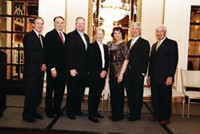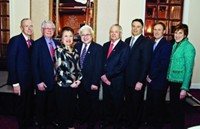Advertisement
Grab your lab coat. Let's get started
Welcome!
Welcome!
Create an account below to get 6 C&EN articles per month, receive newsletters and more - all free.
It seems this is your first time logging in online. Please enter the following information to continue.
As an ACS member you automatically get access to this site. All we need is few more details to create your reading experience.
Not you? Sign in with a different account.
Not you? Sign in with a different account.
ERROR 1
ERROR 1
ERROR 2
ERROR 2
ERROR 2
ERROR 2
ERROR 2
Password and Confirm password must match.
If you have an ACS member number, please enter it here so we can link this account to your membership. (optional)
ERROR 2
ACS values your privacy. By submitting your information, you are gaining access to C&EN and subscribing to our weekly newsletter. We use the information you provide to make your reading experience better, and we will never sell your data to third party members.
Careers
ACS Board, Council Focus On The Future
San Francisco council discussion features advice on how to engage younger chemists as leaders of ACS
by Linda R. Raber
October 9, 2006
| A version of this story appeared in
Volume 84, Issue 41

Ensuring the future of the American Chemical Society through long- and short-term planning is always on the minds of ACS councilors and board members. At their recent meetings in San Francisco, issues regarding younger chemists???from their status within the membership of the society to the importance of mentoring young colleagues for leadership roles???were front and center.
If ACS's future depends on today's younger chemists, it also depends on solid finances. The board and council received reports indicating that ACS is in good shape financially. The society is projected to end 2006 with a net contribution from operations of $7.9 million, which is $3.5 million better than the approved budget.
In light of this financial success, the board honored some funding requests. It voted to approve funding at the level of $436,000 in 2007 and $369,000 in 2008 to continue the core operations of the ACS Green Chemistry Institute. It also provided funding at the level of $98,000 in 2007 for the Committee on Professional Training to develop workshops with Hispanic- and Native American-serving institutions.
Among other things, the ACS Board voted to adopt a revised ACS mission statement: "To advance the broader chemistry enterprise and its practitioners for the benefit of Earth and its people." It also approved the request for cooperative cosponsorship of Pacifichem 2010 to be held Dec. 14-19, 2010, in Honolulu, contingent upon approval of an acceptable budget for the conference. It voted to reappoint several of the society's journal editors, and it discussed plans for a third Malta Conference in 2007, titled "Frontiers in Chemistry III: Research & Education in the Middle East," and voted to include $50,000 in the 2007 budget for the Malta meeting.
Notable at the council meeting was the report of the Membership Affairs Committee, which focused on proposals for redefining the conditions of ACS student membership that would, among other things, eliminate the student affiliate membership category, broaden the student member category, and give students a vote in society elections.
In its report to the council, the Society Committee on Education emphasized the importance of the Student Affiliate name.
During the council meeting, ACS President E. Ann Nalley led a 30-minute discussion titled "Ensuring Our Future: Engaging Tomorrow's Leaders Today." The discussion was based on the results of an August survey of councilors that indicated a great deal of consensus about the importance of engaging younger chemists as leaders.
Nalley opened the floor to discussion, and 26 people stepped to one of three microphones in the room. Each councilor who wanted to speak had one minute to do so. The room bubbled with suggestions.
One of the first to speak, Katherine C. Glasgow, chair of the ACS Younger Chemists Committee, suggested one way to bring younger people into leadership positions at ACS would be for local sections to put younger chemists on their executive committees. Even getting younger chemists to section meetings would help, said John C. Crawford of the Philadelphia Section. He encouraged everyone to bring a young person to local section meetings and to other functions.
On that same theme, board member Eric Bigham reminded councilors that "we have all benefited from coaches and mentors in our lives. I think it's extremely important going forward that we try to facilitate being better coaches and mentors. There is very little as powerful as personal contacts." That sentiment was echoed by Francis M. Burns, of the Western Michigan Section, who warned that "electronic communication won't cut it. What does work is high-quality communication such as talking to people one on one."
Richard S. Danchik, councilor for the Pittsburgh Section, believes that getting "encouragement and support from senior management in industry as well as in the academic world" is crucial, a sentiment shared by many at the meeting. Susan R. Fahrenholtz, of the North Jersey Section, urged councilors to try to find ways to "woo" upper management, perhaps by giving out awards.
Also, picking up the tab may help. O. Bertrand Ramsey, of the Huron Valley Section, told councilors that his section sponsors first-year membership for student affiliates. Charlene Hayden, of the Detroit Section, urged letting young people rise to leadership by encouraging them, mentoring them. She advised colleagues "to keep coming back and asking them to do more."
Planning
Governance Review Task Force Shares Findings
The Board-Council Policy Committee Governance Review Task Force reported on its actions to the council in San Francisco. The committee generated 23 ideas, each of which was put into one of three categories: ideas to advance, ideas to refine, and those to stop.
The committee plans to draft a white paper to explain the need and logic of these recommendations for presentation to committees and caucuses at the spring 2007 meeting in Chicago.
Advance: The ideas that were placed in this category were believed to be worthy of further consideration by committees and interested groups. The committee emphasized that these are not current proposals but ideas that need to be developed. With this in mind, the task force was charged, by Nov. 15, to identify a small but representative group of stakeholders as an action team for development, consideration, and recommendation; to work with the ACS Committee on Constitution & Bylaws to understand implications; and, where appropriate, to develop a charge for the action team and a timeline for consideration. The ideas are to:
Include student affiliates as members (continuing their reduced dues category and current benefits) and eliminate the associate member category.
Make all applicants to ACS with a science degree or work experience eligible for full membership. Applicants without a science degree or work experience in chemistry should be accepted into ACS as society affiliates.
Support and provide value to international members without replacing the value of the home national society membership.
Provide additional staff support to local section and regional volunteers.
Dissolve secretariats.
Centralize national meeting program coordination and planning.
Establish a process for creating and dissolving focused interest groups.
Provide additional staff support to technical division volunteers.
Enhance the role of alternate councilors to enhance leadership development potential.
Enhance the communication to and understanding of members about the net-contribution operations of ACS and their relevance to fulfilling the ACS mission.
Revise the process for becoming a petition candidate, including required signatures; codify the academic/industrial rotation and apply it to petition candidates; and make the council part of the petition candidate process.
Refine: The ideas placed into this category are being sent back to the task force for further discussion. By Feb. 15, 2007, the task force is to refine ideas based on further comments received from governance and members and develop potential advancement strategies and plans. By April 30, the task force is to have solicited feedback on the revised ideas and forwarded them to the board and the Council Policy Committee for discussion of next steps. The ideas slated to be refined are those that seek to:
Reduce the number of councilors through attrition, term limits, and restructuring and develop a new formula to determine the number of councilors.
Reduce the number of committees and size of some committees. Clarify committee roles to eliminate redundancy, maximize the policy role, and improve the effectiveness of committee oversight for programs. Explore different models for committee structure.
Appoint more noncouncilors to committees to encourage broader participation and obtain new viewpoints.
Critically review and revitalize the Committee on Chemical Abstracts Service and the Committee on Publications to increase committee member involvement and communication with the membership at large.
Establish term limits for councilors like there are for all other ACS elected and appointed positions.
Stop: The ideas in this category will receive no further action by the task force. They are ideas that seek to:
Apply the student member category dues discount to postdoctoral fellows as well as graduate and undergraduate students.
Explore alternative ways to bring a geographical view to governance and services.
Extend a "regional concept" to the international level.
Have one meeting of the council and some committees per year, rather than two, and use modern technology, for example, teleconferencing, and regional meetings to continue the necessary and valuable interactions.
Identify ways to separate governance activities from the technical programs of national meetings.
Have "at-large" council seats for members elected to the Council Policy Committee, the Committee on Nominations & Elections, and the Committee on Committees.
Use business resources as venture capital for chemistry-related projects.





Join the conversation
Contact the reporter
Submit a Letter to the Editor for publication
Engage with us on Twitter